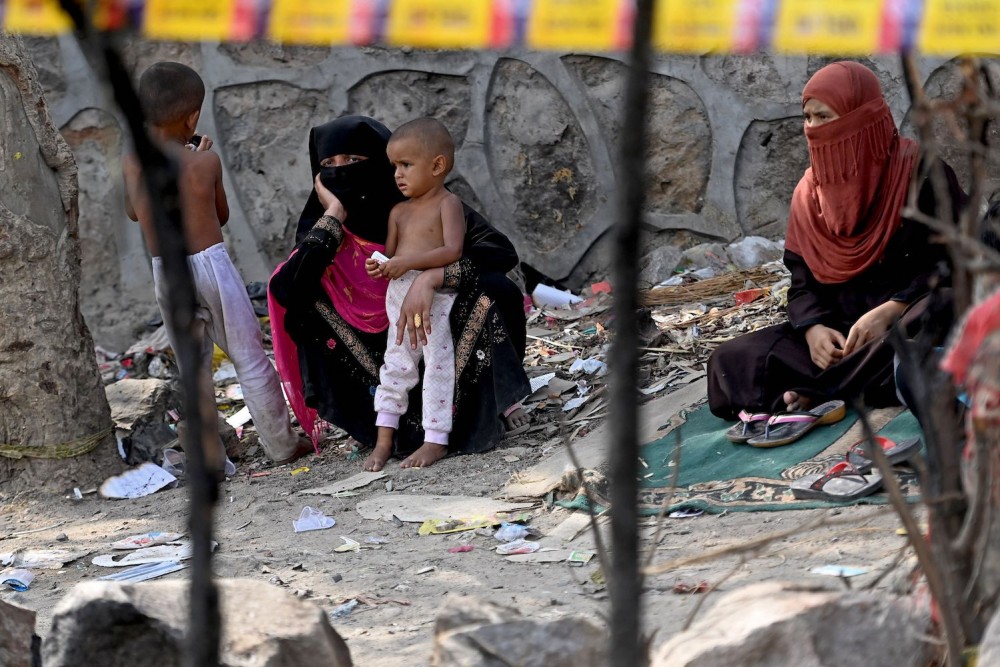Alwaght- Rohingyas, a Muslim ethnic minority group who fled brutal military crackdown in Myanmar, are being persecuted for their religion in India.
The US-based news publication, Foreign Policy, in a recent report said the persecuted ethnic minority has become a target of anti-Muslim sentiment in India where violence against minority Muslims has assumed alarming proportions since the right-wing Bharatiya Janata Party (BJP) rose to power in 2014.
The exodus of persecuted Rohingya Muslims from Myanmar’s Rakhine state started in October 2016. Since then, tens of thousands have relocated to neighboring India, in a bid to escape persecution, murder, arson and rape by the Burmese military backed by the country’s majority Buddhist extremists.
The savagery in Rakhine was described by the United Nations as “a textbook example of ethnic cleansing”. The atrocities against them were widely documented by human rights bodies.
The number of Rohingya Muslims currently living in refugee camps in India is said to be about 17,000.
The report said opportunities and health care in India are “worse than in other countries”, such as in Malaysia, Thailand, and Bangladesh, where thousands of Rohingya refugees are currently scattered.
Referring to the divisive policy changes introduced by the Narendra Modi government in India in recent years, including revoking the special status of Indian-controlled Kashmir, and passing a controversial citizenship law, the report said the Rohingya refugees fear they will be “forced to flee once again.”
In 2017, India’s then-minister of state for home affairs, Kiren Rijiju, said the government has issued detailed instructions for deportation of illegal foreign nationals, including Rohingyas, provoking an unprecedented crackdown against the community.
“Since 2017, our community is being targeted by extremist groups in certain states in India,” the report cited Sabber Kyaw Min, director of the Rohingya Human Rights Initiative and a refugee himself, as saying, referring to the repercussions of Modi government’s refugee policies.
“Camps were set to fire, refugees were beaten, and hate speeches increased against us, and many restrictions have been placed on the mediocre lives we live,” he added, recounting the horrors.
After being threatened of deportation, Modi’s government in October 2018 banned Rohingya refugees from obtaining the Aadhaar card, an essential biometric-based identification document necessary for access to basic services, including banking, health care, education, and jobs in India.
Since then, Sabber Kyaw Min said the coronavirus pandemic has only “deepened survival concerns in a country that offers no legal safeguards to refugees.”
Nasrullah, a refugee living in New Delhi’s Madanpur Khadar camp, is quoted in the report as saying that the entire community was sticking at the camp to avoid falling ill, minimizing movement and using strips of cloth as face masks.
“It was not COVID-19 that we feared. We feared having to die due to dismal finances for treatment at hospitals,” he remarked.
“Would have been better if the virus had killed us,” Salma Bi, a refugee living in a neighboring tent to Nasrullah’s, said, adding that “life until now has been all about fleeing places.”
“We fled Arakan [Myanmar’s Rakhine State]. We fled Bangladesh. Now, here we have a life, but we are not really living. It’s like we’re caged everywhere we go,” she rued.
While the world was engaged in fight against the Covid-19 pandemic, Modi’s Bharatiya Janata Party (BJP) in India was “busy disseminating lies about how Muslims were trying to spread the virus deliberately”, the report stated.
“For Muslim refugees, this relentless discrimination has only compounded the existing difficulties of statelessness and limbo,” it noted.
The report further stressed that anti-Muslim persecution has only worsened this year, noting that nearly 170 Rohingya refugees, including women and children, were placed in Hiranagar subsidiary jail in Kathua of Indian-administered Kashmir in March after the government claimed they were illegal immigrants.
It also highlighted “financial insecurity” of Rohingya Muslim refugees in India.
“Due to lack of documentation, refugees in India can only apply for informal jobs as day laborers, sanitation workers, tailors, tobacco rollers, or …in construction. That means no fixed salary, contract, or medical insurance. This has led many refugee families to work underpaid jobs or survive on the minimal monetary assistance provided by the United Nations High Commissioner for Refugees,” the report read.
Nearly 56 shanties were burnt down at Madanpur Khadar refugee camp in New Delhi on June 12 due to electrical short circuit. It was the second incident of fire at the camp in three years.
“In Myanmar, we ran fearing the military,” said one refugee, who asked not to be named, adding “And here, we were running to save our future from falling apart.”
In nearby Sharan Vihar camp, flooding killed Mohammed Jashim, an 18-year-old refugee, after stepping into water that was touching a live wire in his tent on September 1, leaving his parents “cursing their fate.
“They kept saying that the boy wanted to earn well for them,” according to Noorul Amin, a refugee from the camp, quoted in the report.
In the northern state of Haryana, Mohammed Rofiq, a 29-year-old Rohingya refugee living at a camp in the town of Punhana, said “When it rains, it fills the tent, and our belongings float away in front of our eyes.”
He recalled a recent incident on September 17 when a snake bit a sleeping 3-year-old in their camp and “the child turned blue and died instantly”.
“This is the kind of accommodation we live in; this is our life as refugees,” he said.



























